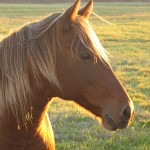Every week in The Kiddy Pool, Erin Newcomb confronts one of many issues that parents must deal with related to popular culture.
I fell in love with Trixie at “Aggle flaggle klabble!” The lovable little girl from the Knuffle Bunny series embodies all the things that children’s writer Mo Willems does best: intimate, expressive, poignant characterization. Set against the photographed backgrounds, the simple elegance of Willems’ drawings amplifies real, raw emotions.
In the first book, Knuffle Bunny: A Cautionary Tale, we go along with Trixie and her daddy to the Laundromat—and watch the drama unfold as Knuffle Bunny is lost and ultimately found. The second book, Knuffle Bunny Too: A Case of Mistaken Identity, shows an older and more articulate Trixie heading off to pre-school, where she makes a new friend and discovers that her Knuffle Bunny is “not-so-one-of-a-kind.” As the series progresses, Trixie grows up and her adventures with Knuffle Bunny engage with more and more of the world around her. The story’s scope increases in proportion to Trixie’s explorations, yet in the first two books, Willems never loses sight of his strengths. Trixie’s facial expressions, her loving and funny interactions with her family, and Willems’ pithy dialogue make the Knuffle Bunny stories feel like home.
All of that changes in the third and final installment of the series, Knuffle Bunny Free: An Unexpected Diversion. In this disappointing conclusion, the family heads to Holland, and unsurprisingly, Knuffle Bunny gets lost along the way and recovered at the end. It’s not the predictability that makes this story wilt, though. Instead of an intimate portrait, it’s a sweeping narrative with little dialogue, boring character interactions, and the basic creative writing issue of too much telling. Add to that a dull dream sequence that fails as an effective turning point for the tale and includes a lot of awkward fold-out pages that only detract from the reading experience.
I imagine many readers find satisfaction in the ending, where we see Trixie all grown up and can feel a sort of vicarious pride at her development. I also believe that the third book is quite meaningful for Trixie and her real-life daddy, but I can’t help thinking that Willems, in all his comedic talent, sold this one short. The beauty of the first two Knuffle Bunny books lies in the powerful emotions of the everyday, small exchanges imbued with meaning; Knuffle Bunny Free trades those things in for a grand scale that just conveys a less effective message and a less interesting story. I still love Trixie and Knuffle Bunny, but I feel like Knuffle Bunny Free is a diversion that lost its way.











